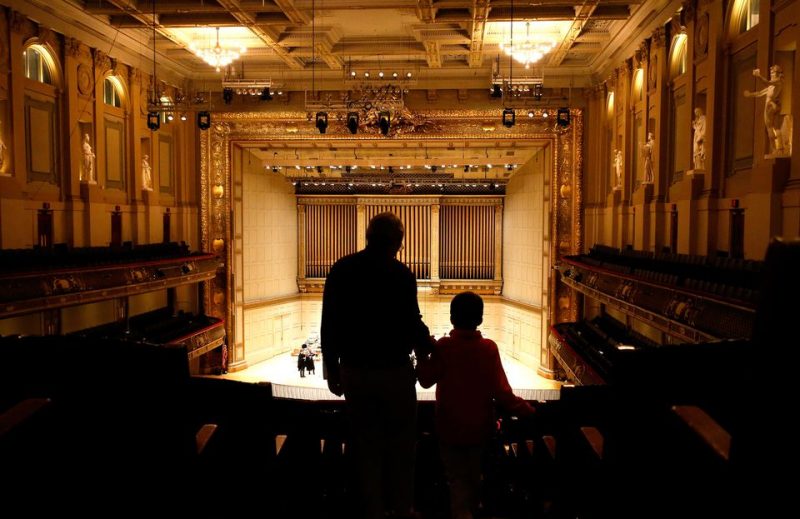Handel and Haydn Society welcomes “wow child” as special guest
by Zoe Greenberg
The Handel and Haydn Society was preparing for a final dress rehearsal at Symphony Hall, and everything was in its place. Musicians clad in black tuxedos and floor-length gowns tuned a harpsichord and cellos on the grand stage. The Greek statues above the balcony peered down on rows of empty seats. The chandeliers twinkled.
And then a little boy in a bright orange fleece pushed open the doors and peeked his head inside. It was time. The symphony’s special guest had arrived.
Ronan Mattin, a 9-year-old from New Hampshire, is something of a celebrity at Symphony Hall, where he is known colloquially as the “wow child.” He earned the name in the spring, when his grandfather brought him to a Handel and Haydn Society concert there. After the orchestra finished playing a piece by Mozart, the crowd went silent, and Ronan loudly exclaimed, “Wow,” delighting the conductor, the musicians, the concert attendees, and people all over the world.
Soon the society was desperately trying to figure out who Ronan was; when they tracked him down, they announced on Facebook, “We have found the ‘wow’ child!” Ronan is on the autism spectrum, and his spontaneous reaction seemed to sum up the ineffable feeling people have had for centuries listening to one of the world’s best-loved composers.
And so this week, the orchestra invited Ronan and his family to attend a dress rehearsal of the season’s first concert, a “Mozart Celebration,” as a special guest. He left school early to attend. His parents couldn’t make it, so he was accompanied by his grandparents, who live less than a mile from him in Kensington, N.H. Ronan spoke only a few words during the Symphony Hall visit, but his grandparents said he was thrilled. They had driven an hour to attend the concert, and he was excited all the way down.
“He was tapping the window and jumping up and down,” said his grandmother, Claire Mattin. The little boy seemed to mean as much to the musicians as they meant to him. “These sort of moments, like Ronan’s wonderful ‘wow’ moment, are just electrifying for us, and actually just make us realize exactly what we’re here doing,” said Harry Christophers, the society’s artistic director and this show’s conductor. Before the dress rehearsal, Ronan wandered the halls and rode the elevator a few times (he is passionate about elevators). Then he spotted two musicians practicing trombone. “Yeah, music,” he said, pushing open the glass doors to the lobby. Inside, he carefully examined the instruments and the sounds they made. “Do you want to feel my bell and what happens when I play?” asked Toby Oft, the principal trombonist for the Boston Symphony Orchestra. “Sound is vibrations.” Ronan put his hand on the bell as Oft played a long low tone. “Feel the vibrations?” Oft said. Ronan extended the slide to the floor.

Ronan got a hands-on demonstration of the trombone from Toby Oft of the Boston Symphony Orchestra.JESSICA RINALDI/GLOBE STAFF/GLOBE STAFF
The hall, which seats more than 2,500 people, was mostly empty. Ronan rode the elevator to the top balcony with his grandfather, Stephen Mattin; from there, the world-class musicians onstage looked like little dolls with toy instruments. Ronan sat on Mattin’s lap, eyes wide, mouth slightly open, his brown bangs just about to fall into his eyes, listening. The orchestra has developed a friendship with Ronan, even sending principal cellist Guy Fishman to the family’s home to show Ronan his cello, which is hundreds of years old. “I’m sitting holding him because he’s obsessed with instruments,” said Mattin, recalling Fishman’s visit. “He sees an instrument and he dives for it.” After Ronan let out his “wow” in the spring, his grandfather had whisked him out of the concert hall, concerned that he had disrupted the audience. When his grandparents learned that the symphony was looking for the little boy, they weren’t sure they should reveal who he was. They thought if they came forward, “there’s going to be some retribution,” said Claire Mattin, chuckling. Instead, Ronan has become a model of how classical music can move people of all ages. “We’re here to give people a release from their daily existence,” Christophers said. “With Ronan, it’s spontaneous, it’s an innocence, it’s just lovely.” At home, Ronan listens to classical music on an iPad in his room and has a guitar and a drum set. Asked if he plays the instruments, his grandmother shook her head. “Not yet,” she said. “But he will.”

Ronan Mattin (right) is “obsessed with instruments,” said his grandfather, Stephen Mattin (left). “He sees an instrument and he dives for it.”JESSICA RINALDI/GLOBE STAFF/GLOBE STAFF
